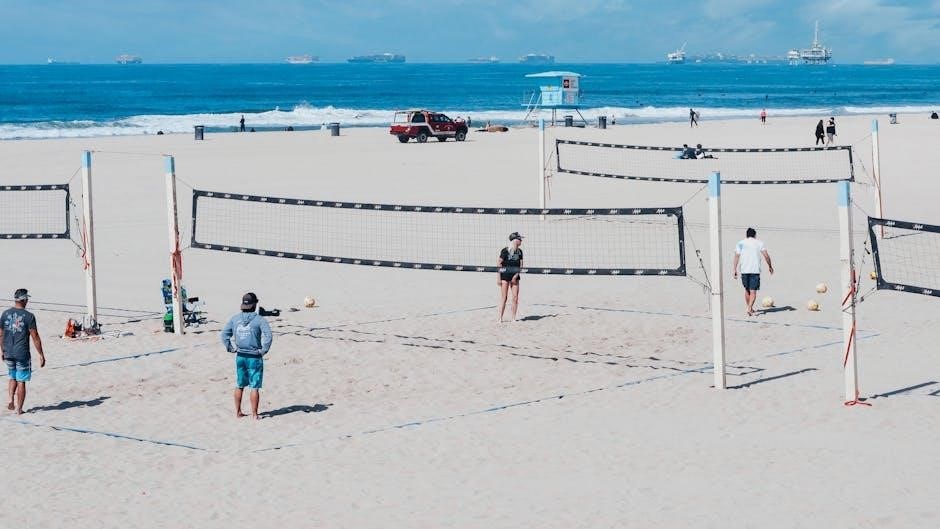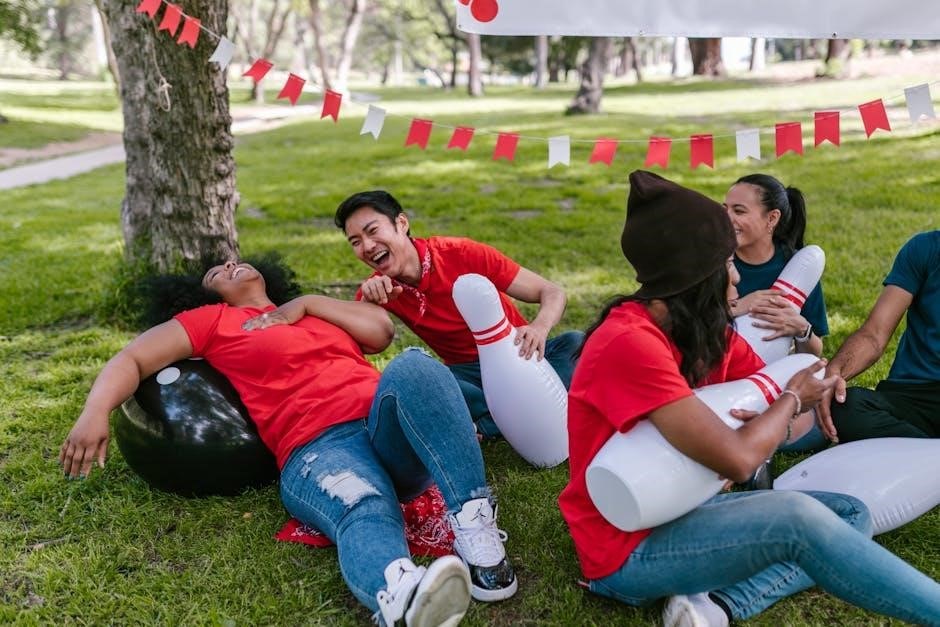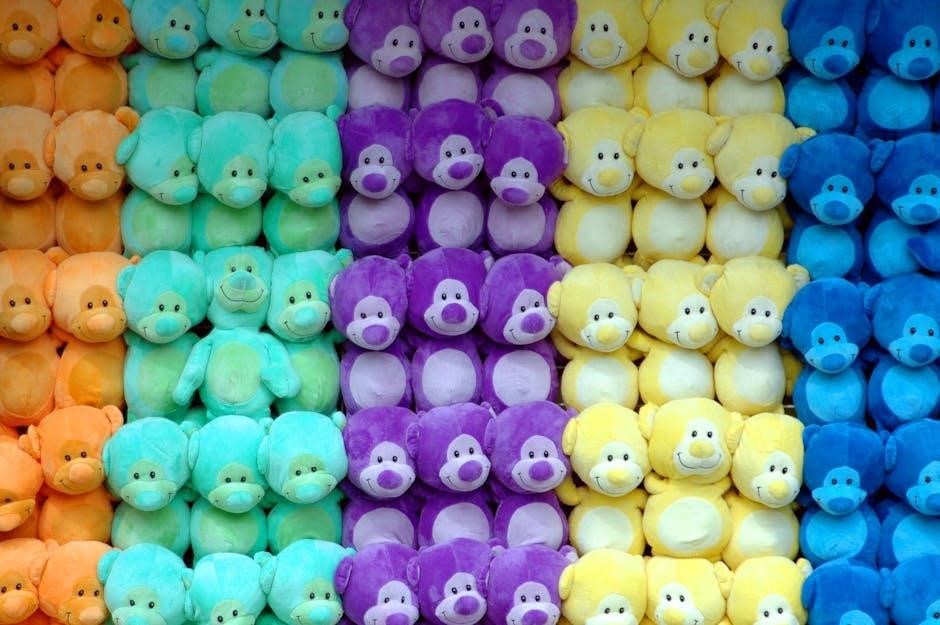Recovery games are interactive activities designed to aid individuals in their journey toward healing and growth‚ fostering connection and engagement in a supportive group environment.
What Are Recovery Games?
Recovery games are structured activities designed to promote mental‚ emotional‚ and social growth‚ often used in therapeutic or support group settings. These games are typically interactive‚ incorporating elements like art‚ movement‚ or group challenges to foster engagement and connection. Examples include Gratitude Graphs‚ Popsicle Sticks Activity‚ and The Chocolate Chip Game‚ which aim to encourage reflection‚ teamwork‚ and emotional expression. They create a safe space for participants to share experiences‚ build trust‚ and develop coping strategies‚ making them a valuable tool in recovery journeys.
Importance of Group Activities in Recovery
Importance of Group Activities in Recovery
Group activities play a vital role in recovery by fostering connection and community among participants. They reduce feelings of isolation‚ promote shared experiences‚ and encourage accountability. Engaging in group exercises helps individuals build trust‚ develop communication skills‚ and gain perspectives from others facing similar challenges. These activities also provide a supportive environment where participants can practice healthy behaviors‚ celebrate progress‚ and learn from one another. The collective energy of a group can motivate individuals to stay committed to their recovery journey‚ making the process more meaningful and sustainable.
Benefits of Group Recovery Games
Group recovery games enhance emotional well-being‚ foster teamwork‚ and create a supportive environment. They encourage engagement‚ reduce stress‚ and make the recovery process enjoyable and motivating.
Building Teamwork and Collaboration
Recovery games foster teamwork by encouraging group members to work together toward common goals. Activities like role-playing or crafting promote active participation and trust. Shared challenges help individuals rely on each other’s strengths‚ enhancing collaboration. These exercises create a supportive environment where teamwork becomes a natural outcome‚ strengthening bonds and mutual understanding. By engaging in these games‚ participants learn to value diverse perspectives‚ fostering a sense of unity and cooperation essential for the recovery journey.
Encouraging Emotional Expression
Recovery games provide a safe space for individuals to express their emotions openly. Activities like art-based exercises or sharing personal stories encourage participants to communicate their feelings. These games help individuals process emotions related to their recovery journey‚ fostering self-awareness and empathy. By creating a non-judgmental environment‚ recovery games empower participants to articulate their experiences‚ promoting emotional healing and deeper connections within the group. This expression of emotions is a crucial step in the recovery process‚ aiding personal growth and resilience.
Promoting Accountability and Support
Recovery games foster accountability by encouraging participants to take responsibility for their actions and progress. Group activities like Relapse Prevention Bingo or Recovery Bingo promote peer support‚ where individuals share experiences and challenges. These games create a structured environment where participants can hold each other accountable while offering encouragement. By engaging in shared goals‚ participants build trust and reliance on one another‚ strengthening their commitment to recovery. This mutual support system enhances accountability and reinforces the importance of collective effort in the healing process.
Adding Fun to the Recovery Process
Recovery games infuse fun into the healing journey‚ making it more engaging and enjoyable. Activities like Gratitude Graphs or The Chocolate Chip Game create lighthearted moments‚ reducing stress and anxiety. By incorporating playful elements‚ these games help participants stay motivated and invested in their progress. Fun and laughter break down barriers‚ fostering a positive environment where individuals feel comfortable sharing and growing. This approach makes the recovery process less intimidating‚ encouraging active participation and a more holistic approach to healing.

Popular Recovery Games for Groups
Engaging and effective‚ these activities include Gratitude Graphs‚ Popsicle Sticks‚ Crafting for Recovery‚ and The Chocolate Chip Game‚ designed to foster connection and growth in group settings.
Gratitude Graphs
Gratitude Graphs are a visually engaging activity where participants create a collaborative or individual graph‚ plotting things they are grateful for in their lives. Using colored markers or stickers‚ individuals mark moments‚ people‚ or experiences that bring them joy‚ fostering a sense of positivity and mindfulness. This activity encourages group members to reflect on the good in their lives‚ promoting emotional well-being and resilience. It also serves as a therapeutic tool to shift focus from challenges to blessings‚ enhancing overall mental health and group connections.
Popsicle Sticks Activity
The Popsicle Sticks Activity is a fun and interactive game where participants use popsicle sticks to build structures or solve challenges. This activity encourages creativity‚ teamwork‚ and problem-solving while fostering trust and communication among group members. It is often used in recovery settings to promote collaboration and accountability‚ helping individuals build stronger connections with others in their group. The simplicity of the task allows participants to focus on the process‚ making it an effective tool for enhancing interpersonal skills and confidence in a supportive environment.
Crafting for Recovery
Crafting for Recovery involves creating items like vision boards‚ masks‚ or jewelry‚ fostering mindfulness and self-expression. This activity allows individuals to process emotions and experiences through art‚ providing a therapeutic outlet. It enhances their recovery journey by offering a sense of accomplishment and pride. Additionally‚ it promotes trust and support within the group‚ reinforcing the importance of community in the healing process and encouraging lasting connections among participants.
The Chocolate Chip Game
The Chocolate Chip Game is a fun and engaging activity where participants receive a treat with a hidden message or challenge. This game encourages individuals to share their thoughts and experiences‚ fostering connection and reflection. It helps participants practice honesty and openness in a lighthearted manner‚ making it an effective tool for building trust and camaraderie within the group. The activity also promotes mindfulness and gratitude‚ offering a unique way to address recovery themes while enjoying a simple treat.
Facilitating Recovery Games
Facilitating recovery games requires a structured approach‚ ensuring a safe environment‚ clear communication of objectives‚ and active engagement. Guides help participants stay focused‚ fostering meaningful interactions and shared growth.
Preparing Materials and Setting the Environment
Preparing materials and setting the environment is crucial for effective recovery games. Gather supplies like chart paper‚ markers‚ or art materials based on the activity. Ensure the space is comfortable and conducive to interaction‚ arranging seating to promote group engagement. A well-organized setup helps participants focus and feel at ease‚ fostering a supportive atmosphere for recovery and growth.
Explaining Rules and Objectives
Clearly explaining the rules and objectives of recovery games ensures participants understand their purpose and how to engage effectively. Leaders should outline the structure‚ duration‚ and goals of each activity‚ emphasizing how it supports recovery. Providing examples or demonstrations can help clarify expectations. Aligning the activity’s objectives with the group’s recovery goals fosters relevance and focus. Transparent communication encourages participation and helps create a sense of shared understanding and purpose among all involved;
Encouraging Participation and Engagement
Creating a supportive and inclusive environment is key to encouraging participation in recovery games. Leaders should emphasize that every contribution‚ no matter how small‚ is valued. Icebreakers and low-stakes activities can help ease tension and build comfort. Offering choices and incorporating diverse interests ensures the games resonate with all participants. Positive reinforcement‚ such as acknowledging efforts and progress‚ fosters motivation. Encouraging hesitant individuals by normalizing their feelings and highlighting the benefits of engagement can also promote active involvement.
Discussing Outcomes and Reflections
Facilitating meaningful discussions after recovery games is crucial for processing emotions and experiences. Leaders should guide participants in reflecting on their insights‚ challenging moments‚ and successes. Open-ended questions can help individuals connect the activity to their personal growth and recovery goals. Sharing observations and feelings fosters deeper understanding and bonding among group members. This step ensures that the lessons learned are internalized‚ making the recovery process more impactful and transformative for everyone involved.

Therapeutic Benefits of Recovery Games
Recovery games enhance emotional well-being by reducing stress‚ improving cognitive function‚ and fostering social connections. They promote self-esteem‚ accountability‚ and resilience‚ aiding individuals in their healing journey.
Improving Cognitive Function
Recovery games enhance cognitive function by engaging memory recall‚ attention‚ and problem-solving skills. Activities like Gratitude Graphs and crafting exercises stimulate the brain‚ improving mental clarity and focus. These structured games encourage participants to think critically‚ fostering creativity and logical reasoning. By addressing cognitive challenges in a supportive environment‚ recovery games help individuals regain confidence in their mental abilities‚ promoting overall neurological health and resilience.
Reducing Stress and Anxiety
Reducing Stress and Anxiety
Recovery games play a vital role in reducing stress and anxiety by providing a safe‚ engaging environment for emotional expression. Activities like mindfulness exercises and creative art sessions encourage participants to unwind and manage stress. The structured nature of these games helps individuals focus on the present‚ diverting their minds from anxiety triggers. By fostering relaxation and calm‚ recovery games contribute to emotional well-being‚ enabling participants to cope with stress more effectively and maintain a positive mental state throughout their recovery journey.
Building Confidence and Self-Esteem
Recovery games significantly contribute to building confidence and self-esteem by providing opportunities for individuals to achieve small successes and receive positive feedback. Activities like role-playing scenarios and vision board creation encourage self-expression and recognition of personal strengths. Group interactions foster a supportive environment where participants can share accomplishments and feel valued. These experiences help individuals rebuild their self-image‚ fostering resilience and empowering them to take control of their recovery journey with renewed confidence and a stronger sense of self-worth.

Adapting Games for Different Group Needs
Recovery games can be tailored to accommodate diverse group dynamics‚ ensuring activities are inclusive and effective for all participants‚ regardless of size or cultural background.
Games for Large Groups
Games for Large Groups
Large group recovery games are designed to engage many participants‚ fostering teamwork and connection. Activities like Recovery Bingo or Toss n Talk-About Addiction Ball encourage interaction and reflection. These games are ideal for settings with 10 or more people‚ ensuring everyone feels involved. They often involve icebreakers‚ role-playing‚ or collaborative challenges‚ making them dynamic and inclusive. Such games help break down barriers‚ promote unity‚ and create a supportive environment for healing and growth among all participants.
Games for Small‚ Intimate Settings
Small group recovery games are perfect for intimate settings‚ fostering deeper connections and personal reflection. Activities like Two Truths and a Lie or Sharing Fears and Visions encourage authenticity. These games are ideal for groups of 5-10 people‚ allowing each participant to share openly. They often involve creative expression‚ such as crafting or journaling‚ creating a safe space for vulnerability. Such games help build trust and encourage individuals to open up‚ promoting meaningful interactions and emotional healing in a close-knit environment.
Incorporating Cultural and Personal Preferences
Incorporating cultural and personal preferences into recovery games ensures inclusivity and relevance‚ making activities more engaging and meaningful. Games can be adapted to reflect participants’ cultural backgrounds‚ such as using traditional symbols or themes. Personal preferences‚ like interests or hobbies‚ can also be integrated to enhance participation. For example‚ art-based games can incorporate cultural motifs‚ while role-playing scenarios can address personal values. This tailored approach fosters a sense of belonging and ensures that recovery activities resonate deeply with each individual‚ promoting a more personalized and effective healing process.

Resources for Recovery Games
- Recommended PDF guides offer structured activities for group recovery‚ such as “50 Addiction Recovery Group Activities” and “The Recovery Journey Game.”
- Books like “Outside-the-Box Recovery” and tools like “Toss n Talk-About Addiction Ball” provide creative and engaging resources for therapists and group leaders.
Recommended PDF Guides and Worksheets
PDF guides like “50 Addiction Recovery Group Activities” and “The Recovery Journey Game” provide structured exercises for group therapy. These resources include worksheets for tracking progress‚ mindfulness exercises‚ and creative activities like gratitude graphs and relapse prevention plans. They are designed to engage participants‚ foster connection‚ and support long-term recovery. Many guides are downloadable and adaptable to various group sizes and needs‚ offering flexible tools for therapists and group leaders to enhance recovery sessions creatively and effectively.
Suggested Books and Manuals
Suggested Books and Manuals
Manuals such as “The Use‚ Abuse‚ and Recovery Game” and “Outside-the-Box Recovery” offer comprehensive strategies for group therapy. These books provide detailed exercises‚ role-playing scenarios‚ and creative activities to support recovery. Titles like “Sensory Group Activities for Adults” cater to diverse needs‚ while “Women’s Group” focuses on gender-specific healing. These resources are invaluable for therapists‚ offering practical and engaging methods to facilitate growth and connection in recovery settings‚ ensuring sessions are both effective and meaningful for participants.
Recovery games for groups offer a powerful tool for fostering healing‚ connection‚ and growth. By incorporating fun and engaging activities‚ these games create a supportive environment where individuals can express emotions‚ build trust‚ and develop essential life skills. Whether through creative exercises or structured challenges‚ recovery games provide a therapeutic outlet that complements traditional methods. Their adaptability to various settings makes them a valuable resource for therapists and facilitators‚ ensuring meaningful and impactful experiences for all participants.

Leave a Reply